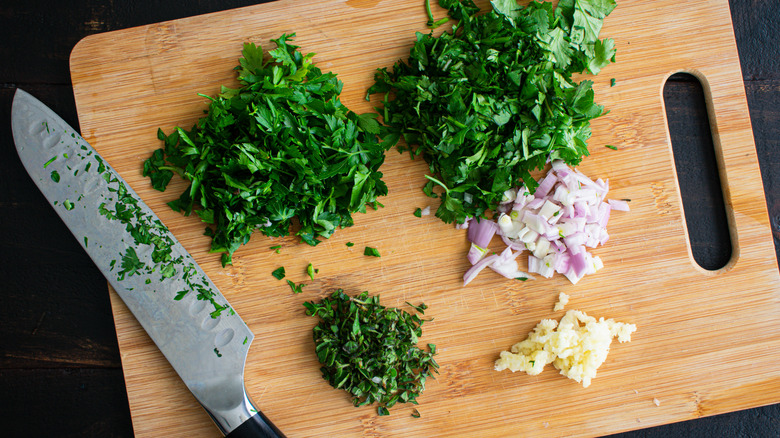Unexpected Side Effects Of Eating Parsley
A colorful garnish sitting atop your favorite fish, pasta, or potato salad dish, parsley gives our meals a little extra flavor by adding a slightly bitter taste to the mix (via Healthline). While it's easy to write off the little green herb simply as decoration, what you might not know is that eating parsley can come with some surprising side effects — some positive and some potentially unsafe.
On the one hand, parsley is ripe with nutrients including 53% of your recommended daily intake of vitamin C, 108% of your daily dose of vitamin A, and 547% of your recommended daily consumption of vitamin K, reports Healthline. But the benefits don't stop there. A 2015 study published in Advances in Regenerative Biology found that a compound contained in parsley known as apigenin may boost neural connections within the brain. This compound may support memory, learning, and potentially protect against cognitive decline. Additionally, a 2016 study published in Breast Cancer: Targets and Therapy found that another substance harbored in parsley — luteolin — may help protect against the spread of a dangerous form of breast cancer known as triple-negative breast cancer.
Potential negative side effects of parsley
Although parsley generally doesn't pose any harm when eaten in average amounts found in food, there are cases in which overconsumption of parsley may be hazardous to one's health, reports WebMD. For example, ingesting excess amounts of parsley for medicinal purposes while pregnant may be unsafe. Experts warn that consuming copious amounts of parsley in combination with other herbs during the first trimester of pregnancy may be linked with possible birth defects.
WebMD also notes that taking large amounts of parsley may affect those with certain health issues. For example, people with kidney disease are advised to avoid parsley, as certain chemicals found within the herb may exacerbate the condition. Additionally, individuals with high blood pressure will also want to be mindful of how much parsley they ingest. It's possible that parsley can prompt the body to retain sodium, thereby increasing blood pressure levels. Conversely, parsley may reduce blood sugar levels, potentially posing a risk to those with diabetes. This same effect can also impact those undergoing surgical procedures. Therefore, it's advised that individuals with upcoming surgeries stop using parsley 14 days beforehand.


